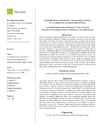Identificador persistente para citar o vincular este elemento:
https://accedacris.ulpgc.es/jspui/handle/10553/72701
| Título: | Competitividad e innovación: Teoría versus Práctica en la medida de competitividad turística | Otros títulos: | Competitiveness and Innovation: Theory Versus Practice in the Measurement of Tourism Competitiveness | Autores/as: | Domareski Ruiz, Thays Cristina Chim MIiki, Adriana Fumi |
Clasificación UNESCO: | 531290 Economía sectorial: turismo | Palabras clave: | Cooperation Destination Behavior Tourism Innovation, et al. |
Fecha de publicación: | 2019 | Publicación seriada: | El Periplo Sustentable | Resumen: | This paper analyzes the content of three competitiveness monitors aiming to identify the variables in these monitors that check the level of innovation or capacity for innovation. Thus, the TTCI (Travel & Tourism Competitiveness Index) WEF (World Ecoomic Forum) and the Monitor of Tourism Competitiveness of MTur/Brazil are compared with the GCI (Global Competitiveness Index) of WEE. The analysis is based on theories/concepts of innovation, considering the factors and obstacles cited in the literature as variables that act on the generation of innovative capacity. The methodology is qualitative and it's performed by a literature review and content analysis. The results indicate that there is no consistency between theory and practice for a proper linkage between the construct competitiveness and innovation. Although the theory establishes a direct relationship between them, in the practical plan was noted that competitiveness monitors have not variables to measure innovation in its structure. Therefore, these monitors are not considering this direct relationship, it means that do not consider the importance of the innovation effect on tourism competitiveness. El presente artículo realiza un análisis del contenido de tres monitores de medición de la competitividad objetivando identificar las variables presentes en estos monitores que verifican el nivel de innovación o de capacidad para innovación. Así, se analizó los monitores TTCI (Travel & Tourism Competitiveness Index) de WEF (World Ecoomic Forum) y el Monitor de Competitividad Turística de Brasil de MTur/FGV, comparándolos con el monitor de competitividad general, el GCI (Global Competitiveness Index) de WEF. El análisis es bajo las teorías/conceptos de innovación, considerando los factores y obstáculos citados en la literatura como variables que actúan sobre la generación de la capacidad innovadora. La metodología es cualitativa, de revisión bibliográfica y análisis de contenido. Los resultados indican que no existe una coherencia entre la teoría y la práctica para una correcta vinculación entre el constructo competitividad e innovación. Pues, aunque la teoría plantea una relación directa entre ellos, en el plan práctico se observó que los monitores de competitividad no poseen variables para medir la innovación en su estructura. Por tanto, los monitores analizados no están considerando esta relación directa, tampoco la importancia del efecto de la innovación sobre la competitividad turística. |
URI: | https://accedacris.ulpgc.es/handle/10553/72701 | ISSN: | 1870-9036 | Fuente: | El periplo sustentable [ISSN 1870-9036], n. 36, p. 134-156, (Enero-Junio 2019) |
| Colección: | Artículos |
Visitas
172
actualizado el 15-ene-2026
Descargas
32
actualizado el 15-ene-2026
Google ScholarTM
Verifica
Comparte
Exporta metadatos
Los elementos en ULPGC accedaCRIS están protegidos por derechos de autor con todos los derechos reservados, a menos que se indique lo contrario.
